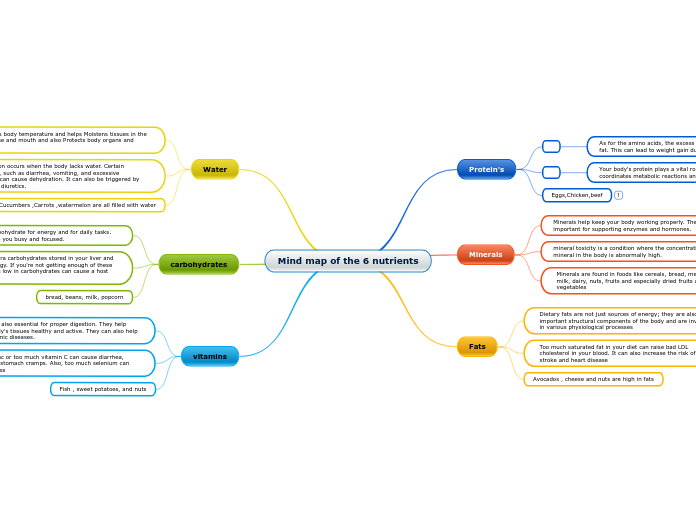
As for the amino acids, the excess protein is usually stored as fat. This can lead to weight gain due to its effects on the body.
Your body's protein plays a vital role in many ways. It coordinates metabolic reactions and helps repair tissues.
Eggs,Chicken,beef
Minerals help keep your body working properly. They are also important for supporting enzymes and hormones.
mineral toxicity is a condition where the concentration of a mineral in the body is abnormally high.
Minerals are found in foods like cereals, bread, meat, fish, milk, dairy, nuts, fruits and especially dried fruits and vegetables
Dietary fats are not just sources of energy; they are also important structural components of the body and are involved in various physiological processes
Too much saturated fat in your diet can raise bad LDL cholesterol in your blood. It can also increase the risk of stroke and heart disease
Avocados , cheese and nuts are high in fats
Regulates body temperature and helps Moistens tissues in the eyes, nose and mouth and also Protects body organs and tissues
Dehydration occurs when the body lacks water. Certain conditions, such as diarrhea, vomiting, and excessive sweating, can cause dehydration. It can also be triggered by the use of diuretics.
Cucumbers ,Carrots ,watermelon are all filled with water
Your body uses carbohydrate for energy and for daily tasks. They also help keep you busy and focused.
Your body can use extra carbohydrates stored in your liver and muscles to boost energy. If you're not getting enough of these nutrients, a diet that's low in carbohydrates can cause a host of health problems.
bread, beans, milk, popcorn
Vitamins are also essential for proper digestion. They help keep the body's tissues healthy and active. They can also help prevent chronic diseases.
Too much zinc or too much vitamin C can cause diarrhea, nausea, and stomach cramps. Also, too much selenium can cause hair loss
Fish , sweet potatoes, and nuts